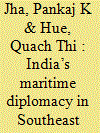| Srl | Item |
| 1 |
ID:
190956


|
|
|
|
|
| Summary/Abstract |
The 1906 Universal Exposition hosted in Milan was a defining moment for the late Qing in terms of its fisheries development. The exhibition not only allowed China to portray its strategic focus on its fisheries but also its determination to be seen as a modernized and progressive sea power in Asia. China’s involvement in this world’s fair also paralleled the process of political and economic consolidation of some of the country’s intellectuals at the turn of the nineteenth century. These intellectuals’ accumulated experience, common goals, and international consciousness made it possible to assemble a group of professional experts I refer to as the ‘new fisheries elites’, who were able to construct the image of China as a modern fisheries power, if not a sea power, at various levels. The first part of this article will situate this exposition within the final two decades of the Qing Empire in the context of the political, social, and cultural transformation that was taking place around the world at the time. China’s presence at the world’s fair during this period displayed the adjustments of a changing and dynamic national image in terms of both its national circumstances and its international situation. The second part will then move on to discuss in what ways the Milan exposition was conceived by elites such as Zhang Jian, Luo Cheng, and Guo Fengming as a paradigmatic setting in which to showcase China’s drive toward modernity and becoming a sea power. Although China had participated in several other universal expositions, the Qing court had clearer and more pragmatic objectives in its participation in Milan in 1906. This was to demonstrate its recent progress and to change the common impression of China as an insecure, inexperienced, and incompetent country in terms of its fisheries governance and maritime vision. To produce this image, Zhang Jian and his team undertook a sensible and impressive approach towards presenting to the world China’s maritime awareness and the long historical continuity between this country and the sea. This was a conscious effort to produce an ideal of what a modern, progressive maritime China should look like.
|
|
|
|
|
|
|
|
|
|
|
|
|
|
|
|
| 2 |
ID:
187141


|
|
|
|
|
| Summary/Abstract |
India–Southeast Asia defence cooperation has not been highlighted much, primarily to not give out wrong signals about India’s power projection outlook. With India steadfastly maintaining that it is a benign nation and not a revisionist power, engagement in the defence domain with Association of Southeast Asian Nations (ASEAN) has been attempted in five ways. The first includes India’s engagement in ASEAN defence mechanisms, such as ASEAN Defence Ministers’ Meeting (ADMM) Plus; and the participation of ASEAN nations in the Milan series of biennial meetings and Indian Ocean Naval Symposium (IONS). The second dimension is India’s legitimate interest in the security of the Malacca Strait as a funnel state. The third dimension is developing synergies between the defence industries in Southeast Asia with the Indian defence industrial complex. The fourth angle of engagement is India’s position as the net security provider in the Indian Ocean Region (IOR). The fifth critical aspect is developing maritime cooperative mechanism and developing a counter to the Chinese “string of pearls” strategy.
|
|
|
|
|
|
|
|
|
|
|
|
|
|
|
|
| 3 |
ID:
109084


|
|
|
|
|
| Publication |
2011.
|
| Summary/Abstract |
In the late 1970s, Italy switched from being a source of émigrés to becoming a recipient of immigrants. The city of Milan and its surrounding region led the way. A multitude of migrant associations sprang up as migrants pursued their quest for recognition as subjects and citizens. This study draws on the author's interviews with members of Milan's migrant associations to examine the inner dynamics both between migrants within associations, and between migrant members and those volunteers, both Italian and of other nationalities, who work with the associations. This study shows that the forms of solidarity and engagement offered by Italian activists represent a platform where the process of identity construction occurs and (mis)recognition practices are played out. As the article will point out, migrants are sometimes quite critical of the activities of Italian activists. In short, the study suggests that the consideration of two dimensions - identity and recognition - as they arise within everyday social practices, could make a useful contribution to the further study of the social phenomena of migrants' associations and political participation.
|
|
|
|
|
|
|
|
|
|
|
|
|
|
|
|